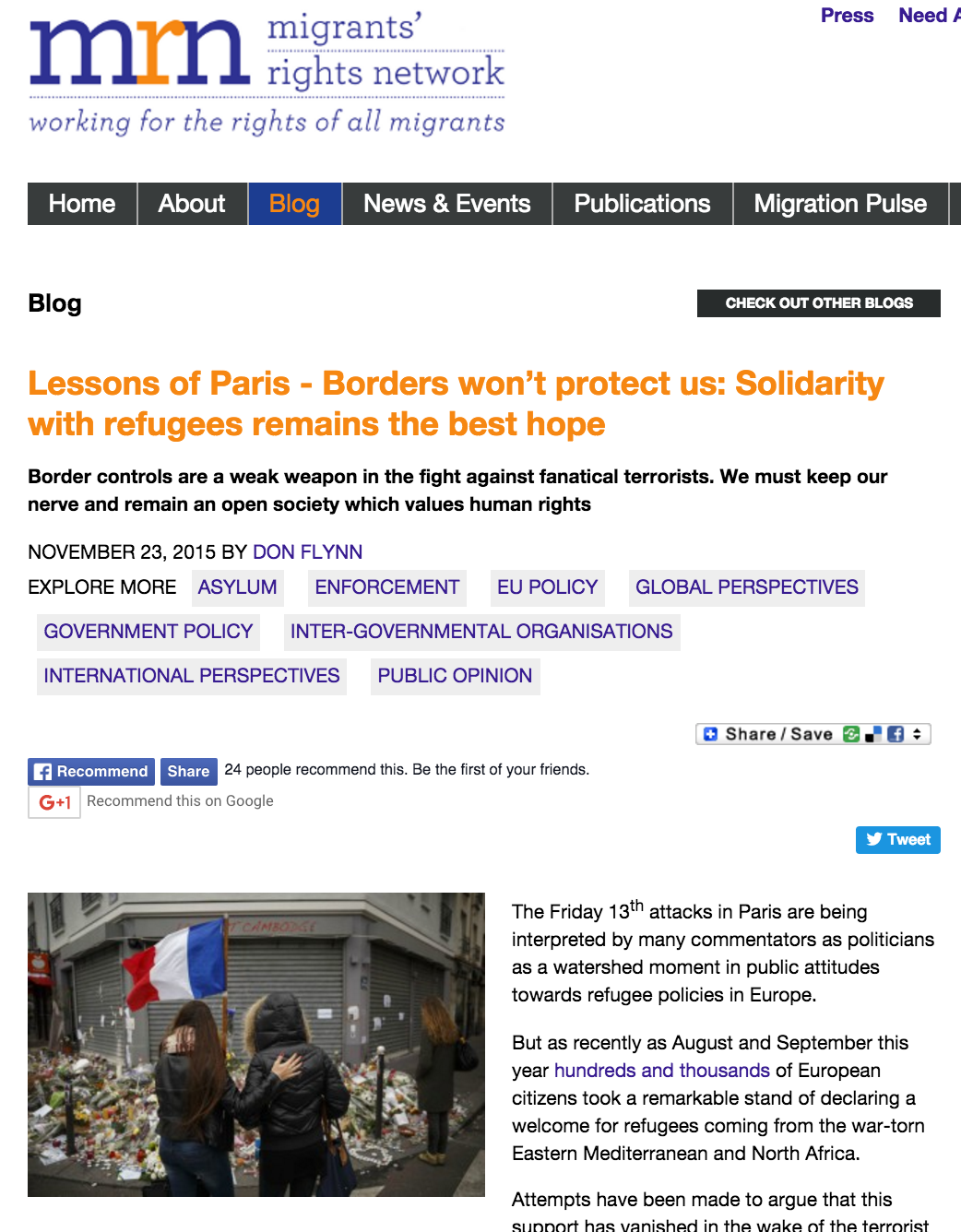Don Flynn*
The Friday 13th attacks in Paris are being interpreted by many commentators as politicians as a watershed moment in public attitudes towards refugee policies in Europe.
But as recently as August and September this year hundreds and thousands of European citizens took a remarkable stand of declaring a welcome for refugees coming from the war-torn Eastern Mediterranean and North Africa.
______________________________________________________________________________
Read full opinion piece here.
_____________________________________________________________________________________
Attempts have been made to argue that this support has vanished in the wake of the terrorist attacks on people enjoying Friday night at music concerts and restaurants in the otherwise peaceful city of Paris. One example of this effort to declare an end to the moods which proclaimed support for the right of refugees to find a safe haven in Europe came in the form of an article in the London Evening Standard on 18 November. Prominent Conservative MP David Davis declared the need for an outright end to the freedom of movement in Europe which has been made possible by the Schengen Agreement.
Davis wrote: “… it is becoming evident that controlling Europe’s external borders, especially the porous borders of southern Europe, is virtually impossible. There are too many physical, legal, political and moral problems inherent in policing that vast frontier effectively.”
He appears to applaud the decisions of the Austrian, French, Dutch and Swedish governments to reintroduce border checks, and even the actions of the Hungarian and Slovak authorities in reinforcing these with kilometres of fencing and razor wire. Perhaps he believes that these actions will solve the “physical, legal, political and moral problems” that get in the way of managing the flow of people across the southern frontiers of the EU.
The proffered solution is a return to a Europe in which national states are responsible for admitting or refusing people entry into their territories and then dealing with the consequences. But, strangely enough, for the countries at the EU’s southern and eastern frontiers, that is exactly the system that has always operated. Greece operates primarily within a framework of Greek immigration policies when it comes to deciding who is permitted to cross its borders; as does Italy; France; Spain; and both Cyprus and Malta.
The claim that we are in today’s predicament because of the overbearing effects of bureaucratically-imposed European policies is clearly fallacious. We are where we are because Europe, acting in concert with other powers in the Eastern Mediterranean, has failed over the course of many years to overcome the crisis which spreads in a great arc from Turkey and across the North African Maghreb, with a tributary branch feeding in from the Horn of Africa. This failure has been allowed to create a great confluence of refugee movements that brings people to its own doorstep.
Declaring a formal end to the Schengen Agreement and reintroducing controls at all the internal borders of the EU will not deal with the situations which led to 218,000 refugees entering Europe in October alone. The driving forces behind these movements, as a recent commentary paper by the European Policy Centre points out, are the continuing upheaval in countries which have put 4.3 million Syrians, 2.6 million Afghans, 1 million Somalis and 600,000 Sudanese onto the road as refugees during the past few years.
‘Fortress Europe’ was never going to hold back the volume of people pressing against its gates indefinitely. The radical measures taken to impoverish the Greek state through austerity might have been the tipping point from struggling efforts to manage to outright crisis but the genie is now out the bottle and won’t easily be persuaded to go back in.
The anti-free movement lobby hopes that if one border can’t do the trick then maybe six, ten or twenty will succeed in holding back the refugee masses in someplace far away. Mr Davis rejoices in the fact that the UK is an island and the convenience of having a surrounding sea ought to buy the country a bit more scope for keeping the refugees out.
It is difficult to be happy with this as a solution to the business of managing refugee movements in the 21st century. The hope that all our neighbours will do the heavy lifting whilst we sit back to reap the benefits will not endear us European countries that want to see more solidarity as they face up to the challenges of processing the claims of those who seek a safe haven.
The attacks in Paris were agonisingly brutal for those who caught up in them. If it is possible for such an appalling situation to be made worse by any subsequent action it has come from the renewed clamour to roll back on refugee and migrant rights. Advocating this response looks too much like the very outcome that fanatics of Daesh have sought to engineer.
The security of ordinary people across Europe will not be enhanced by any measure that reduces the commitment of this region to human rights and the rights of refugees. The re-imposition of border checks on the myriad frontiers of the European states will check, for a time, the flow of desperate people. It will cause more hardship and suffering on top of what they have already had to endure. And it will be a step away from the countries of this region addressing the real root causes of the refugee crisis and will postpone the day when tens of thousands no longer feel that they have to embark on dangerous journeys to get to these shores.
Read original posting here.
This piece was reprinted by Migrant Tales with permission.
*Don Flynn, the MRN Director, leads the organisation’s strategic development and coordinates MRN’s policy and project work. He is a regular and sought-after speaker at conferences, seminars and lectures on behalf of MRN.


